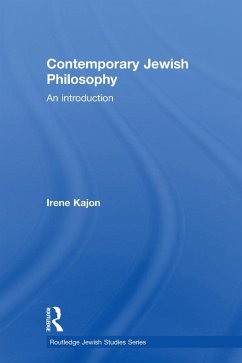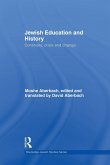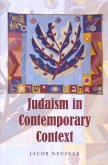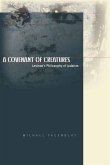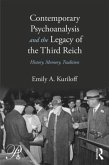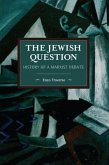- Broschiertes Buch
- Merkliste
- Auf die Merkliste
- Bewerten Bewerten
- Teilen
- Produkt teilen
- Produkterinnerung
- Produkterinnerung
Contemporary Jewish Philosophy offers a comprehensive survey of Jewish philosophy in the twentieth century.
Andere Kunden interessierten sich auch für
![Jewish Education and History Jewish Education and History]() Moshe AberbachJewish Education and History65,99 €
Moshe AberbachJewish Education and History65,99 €![Judaism in Contemporary Context Judaism in Contemporary Context]() Jacob NeusnerJudaism in Contemporary Context32,99 €
Jacob NeusnerJudaism in Contemporary Context32,99 €![Victimhood Discourse in Contemporary Israel Victimhood Discourse in Contemporary Israel]() Victimhood Discourse in Contemporary Israel42,99 €
Victimhood Discourse in Contemporary Israel42,99 €![Reimagining Israel and Palestine in Contemporary British and German Culture Reimagining Israel and Palestine in Contemporary British and German Culture]() Isabelle HesseReimagining Israel and Palestine in Contemporary British and German Culture25,99 €
Isabelle HesseReimagining Israel and Palestine in Contemporary British and German Culture25,99 €![A Covenant of Creatures A Covenant of Creatures]() Michael FagenblatA Covenant of Creatures31,99 €
Michael FagenblatA Covenant of Creatures31,99 €![Contemporary Psychoanalysis and the Legacy of the Third Reich Contemporary Psychoanalysis and the Legacy of the Third Reich]() Emily A KuriloffContemporary Psychoanalysis and the Legacy of the Third Reich52,99 €
Emily A KuriloffContemporary Psychoanalysis and the Legacy of the Third Reich52,99 €![The Jewish Question The Jewish Question]() Enzo TraversoThe Jewish Question30,99 €
Enzo TraversoThe Jewish Question30,99 €-
-
-
Contemporary Jewish Philosophy offers a comprehensive survey of Jewish philosophy in the twentieth century.
Produktdetails
- Produktdetails
- Verlag: Taylor & Francis
- Seitenzahl: 190
- Erscheinungstermin: 9. Juli 2010
- Englisch
- Abmessung: 235mm x 159mm x 11mm
- Gewicht: 249g
- ISBN-13: 9780415593373
- ISBN-10: 0415593379
- Artikelnr.: 54571963
- Herstellerkennzeichnung
- Libri GmbH
- Europaallee 1
- 36244 Bad Hersfeld
- gpsr@libri.de
- Verlag: Taylor & Francis
- Seitenzahl: 190
- Erscheinungstermin: 9. Juli 2010
- Englisch
- Abmessung: 235mm x 159mm x 11mm
- Gewicht: 249g
- ISBN-13: 9780415593373
- ISBN-10: 0415593379
- Artikelnr.: 54571963
- Herstellerkennzeichnung
- Libri GmbH
- Europaallee 1
- 36244 Bad Hersfeld
- gpsr@libri.de
Irene Kajon is Professor of Moral Philosophy at the University of Rome "La Sapienza." A leading interpreter of Jewish philosophy, she is the author of Ebraismo e sistema di filosofia in Hermann Cohen (Padova, 1989) and Fede ebraica e ateismo dopo Auschwitz (Perugia, 1993).
Part 1: Premises 1. The Parabola of Western Humanism 2. The Witness in
Primo Levi's If This is a Man 3. Philosophical Tradition, Judaism, New
Thought Part 2: Hermann Cohen (1842-1918) 1. The Contrast between Mechanism
and Freedom in the Early Writings 2. Interpreting the Kantian Doctrine of
the 'a priori' in the Works on Kant 3. The Idea of Humanity as Producer of
Culture in the Philosophical System 4. The Problems of the Individual and
the Foundation of Ethics in the Jewish Writings 5. The Identification of
Reason with Religious Love in the Opus Postumum Part 3: Franz Rosenzweig
(1886-1929) 1. Searching for the Ideal Man in the Diaries and Letters of
1905 to 1913 2. Revelation and Philosophy in the Texts between 1913 and
1917 and in the Star of Redemption 3. The Question of Jewish and Human
Essence in the Writings on Education and History 4. Faith in God and the
Concept of God in the Comments on the Poems of Yehuda Ha-Levi 5. The Bible
as Expression of the Heart in the Last Reflection Part 4: Martin Buber
(1878-1965) 1. The Refusal of Transcendence between 1900 and 1919 2. The
Lyric-Dramatic Moment of Reality in I and Thou 3. The Analysis of Human
Existence in Biblical Exegesis between 1926 and 1945 4. Education, Social
Philosophy, Hasidic Studies between 1926 and 1945 5. The Problem of Evil in
the Writings 1945-65 Part 5: Leo Strauss (1899-1973) 1. Subjectivism as a
Characteristic of Modernity in the Book on Spinoza 2. The Research on the
Grounds of Liberal Democracy between 1932 and 1936 3. The Rationalism of
Medieval Jewish and Islamic Thought in Philosophy and Law 4. The Meditation
on Natural Right between 1937 and 1966 5. The Antithesis
'Jerusalem'-'Athens', or Fidelity-Pride, in the Last Writings Part 6:
Emmanuel Levinas (1906-1995) 1. The First Contributions: Beyond
Consciousness, Existence, and the Existent 2. The Other as Expression in
Totality and Infinity 3. The Interpretation of Jewish Sources as
Philosophical Analysis 4. The Other in the 'Self' in Otherwise than Being
and in the Last Essays Part 7: A Final Remark: Human Rights, the Truth of
Witnessing, a Philosopher's Duty
Primo Levi's If This is a Man 3. Philosophical Tradition, Judaism, New
Thought Part 2: Hermann Cohen (1842-1918) 1. The Contrast between Mechanism
and Freedom in the Early Writings 2. Interpreting the Kantian Doctrine of
the 'a priori' in the Works on Kant 3. The Idea of Humanity as Producer of
Culture in the Philosophical System 4. The Problems of the Individual and
the Foundation of Ethics in the Jewish Writings 5. The Identification of
Reason with Religious Love in the Opus Postumum Part 3: Franz Rosenzweig
(1886-1929) 1. Searching for the Ideal Man in the Diaries and Letters of
1905 to 1913 2. Revelation and Philosophy in the Texts between 1913 and
1917 and in the Star of Redemption 3. The Question of Jewish and Human
Essence in the Writings on Education and History 4. Faith in God and the
Concept of God in the Comments on the Poems of Yehuda Ha-Levi 5. The Bible
as Expression of the Heart in the Last Reflection Part 4: Martin Buber
(1878-1965) 1. The Refusal of Transcendence between 1900 and 1919 2. The
Lyric-Dramatic Moment of Reality in I and Thou 3. The Analysis of Human
Existence in Biblical Exegesis between 1926 and 1945 4. Education, Social
Philosophy, Hasidic Studies between 1926 and 1945 5. The Problem of Evil in
the Writings 1945-65 Part 5: Leo Strauss (1899-1973) 1. Subjectivism as a
Characteristic of Modernity in the Book on Spinoza 2. The Research on the
Grounds of Liberal Democracy between 1932 and 1936 3. The Rationalism of
Medieval Jewish and Islamic Thought in Philosophy and Law 4. The Meditation
on Natural Right between 1937 and 1966 5. The Antithesis
'Jerusalem'-'Athens', or Fidelity-Pride, in the Last Writings Part 6:
Emmanuel Levinas (1906-1995) 1. The First Contributions: Beyond
Consciousness, Existence, and the Existent 2. The Other as Expression in
Totality and Infinity 3. The Interpretation of Jewish Sources as
Philosophical Analysis 4. The Other in the 'Self' in Otherwise than Being
and in the Last Essays Part 7: A Final Remark: Human Rights, the Truth of
Witnessing, a Philosopher's Duty
Part 1: Premises 1. The Parabola of Western Humanism 2. The Witness in
Primo Levi's If This is a Man 3. Philosophical Tradition, Judaism, New
Thought Part 2: Hermann Cohen (1842-1918) 1. The Contrast between Mechanism
and Freedom in the Early Writings 2. Interpreting the Kantian Doctrine of
the 'a priori' in the Works on Kant 3. The Idea of Humanity as Producer of
Culture in the Philosophical System 4. The Problems of the Individual and
the Foundation of Ethics in the Jewish Writings 5. The Identification of
Reason with Religious Love in the Opus Postumum Part 3: Franz Rosenzweig
(1886-1929) 1. Searching for the Ideal Man in the Diaries and Letters of
1905 to 1913 2. Revelation and Philosophy in the Texts between 1913 and
1917 and in the Star of Redemption 3. The Question of Jewish and Human
Essence in the Writings on Education and History 4. Faith in God and the
Concept of God in the Comments on the Poems of Yehuda Ha-Levi 5. The Bible
as Expression of the Heart in the Last Reflection Part 4: Martin Buber
(1878-1965) 1. The Refusal of Transcendence between 1900 and 1919 2. The
Lyric-Dramatic Moment of Reality in I and Thou 3. The Analysis of Human
Existence in Biblical Exegesis between 1926 and 1945 4. Education, Social
Philosophy, Hasidic Studies between 1926 and 1945 5. The Problem of Evil in
the Writings 1945-65 Part 5: Leo Strauss (1899-1973) 1. Subjectivism as a
Characteristic of Modernity in the Book on Spinoza 2. The Research on the
Grounds of Liberal Democracy between 1932 and 1936 3. The Rationalism of
Medieval Jewish and Islamic Thought in Philosophy and Law 4. The Meditation
on Natural Right between 1937 and 1966 5. The Antithesis
'Jerusalem'-'Athens', or Fidelity-Pride, in the Last Writings Part 6:
Emmanuel Levinas (1906-1995) 1. The First Contributions: Beyond
Consciousness, Existence, and the Existent 2. The Other as Expression in
Totality and Infinity 3. The Interpretation of Jewish Sources as
Philosophical Analysis 4. The Other in the 'Self' in Otherwise than Being
and in the Last Essays Part 7: A Final Remark: Human Rights, the Truth of
Witnessing, a Philosopher's Duty
Primo Levi's If This is a Man 3. Philosophical Tradition, Judaism, New
Thought Part 2: Hermann Cohen (1842-1918) 1. The Contrast between Mechanism
and Freedom in the Early Writings 2. Interpreting the Kantian Doctrine of
the 'a priori' in the Works on Kant 3. The Idea of Humanity as Producer of
Culture in the Philosophical System 4. The Problems of the Individual and
the Foundation of Ethics in the Jewish Writings 5. The Identification of
Reason with Religious Love in the Opus Postumum Part 3: Franz Rosenzweig
(1886-1929) 1. Searching for the Ideal Man in the Diaries and Letters of
1905 to 1913 2. Revelation and Philosophy in the Texts between 1913 and
1917 and in the Star of Redemption 3. The Question of Jewish and Human
Essence in the Writings on Education and History 4. Faith in God and the
Concept of God in the Comments on the Poems of Yehuda Ha-Levi 5. The Bible
as Expression of the Heart in the Last Reflection Part 4: Martin Buber
(1878-1965) 1. The Refusal of Transcendence between 1900 and 1919 2. The
Lyric-Dramatic Moment of Reality in I and Thou 3. The Analysis of Human
Existence in Biblical Exegesis between 1926 and 1945 4. Education, Social
Philosophy, Hasidic Studies between 1926 and 1945 5. The Problem of Evil in
the Writings 1945-65 Part 5: Leo Strauss (1899-1973) 1. Subjectivism as a
Characteristic of Modernity in the Book on Spinoza 2. The Research on the
Grounds of Liberal Democracy between 1932 and 1936 3. The Rationalism of
Medieval Jewish and Islamic Thought in Philosophy and Law 4. The Meditation
on Natural Right between 1937 and 1966 5. The Antithesis
'Jerusalem'-'Athens', or Fidelity-Pride, in the Last Writings Part 6:
Emmanuel Levinas (1906-1995) 1. The First Contributions: Beyond
Consciousness, Existence, and the Existent 2. The Other as Expression in
Totality and Infinity 3. The Interpretation of Jewish Sources as
Philosophical Analysis 4. The Other in the 'Self' in Otherwise than Being
and in the Last Essays Part 7: A Final Remark: Human Rights, the Truth of
Witnessing, a Philosopher's Duty

